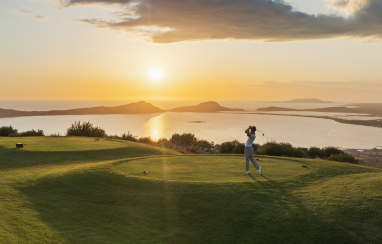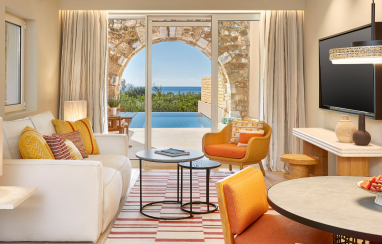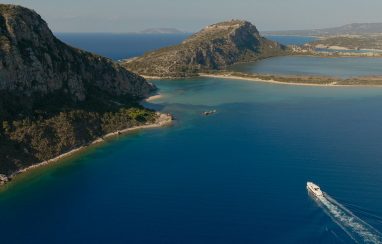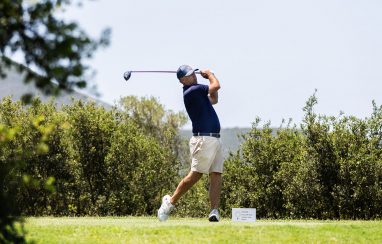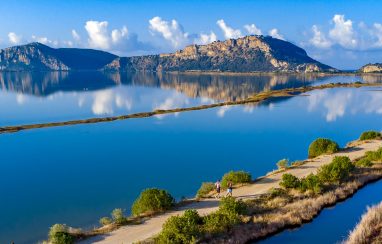Edited by Giorgos Tsiros
He made tennis history as Serena Williams’ coach from 2012 to 2022, developed some of the top players of recent decades, and is recognized as one of the most successful professionals in the sport. Any conversation with him is an insightful seminar on tennis as a sport, a philosophy, and a way of life. As the Mouratoglou Tennis Center at the state-of-the-art facilities of Costa Navarino marks its third anniversary, “The Coach,” as the 54-year-old Frenchman Patrick Mouratoglou is affectionately known, took the opportunity for a brief family vacation—and we, in turn, seized the chance for an engaging conversation with him.
Patrick, welcome to Costa Navarino. How long has it been since you were last here?
It’s been a year, and I’m happy to be back.
Have you had the chance to experience the destination in full bloom with its four hotels, Navarino Agora, and all the other additions?
I can’t say I’ve had the full experience yet, as I’ve mostly stayed at The Westin and Romanos, but I have visited the other hotels and the Agora. The impression is incredible. It feels like a completely new destination in this part of Greece, with so many different options. I want to explore the other hotels and visit all the beaches, especially the one shaped like an Omega. I also took the boat and explored a bit more, and everything I’ve seen is truly impressive.
Do you have any specific plans while in the area?
My main plan is to spend time with my children. I travel all year long and don’t spend enough time with them, so I brought them here to have quality time together. They love swimming, so we’ve been exploring the different pools and the incredible water park. My friends have been trying various sports, as there are many options here. If you have any advice on activities, I’m happy to try everything Costa Navarino has to offer.
Have you tried golf?
I haven’t played much golf. I tried it once and realized how difficult it is. I don’t have the time to invest in it to really enjoy it. I wouldn’t want to play golf badly, so I prefer not to engage with it too much.
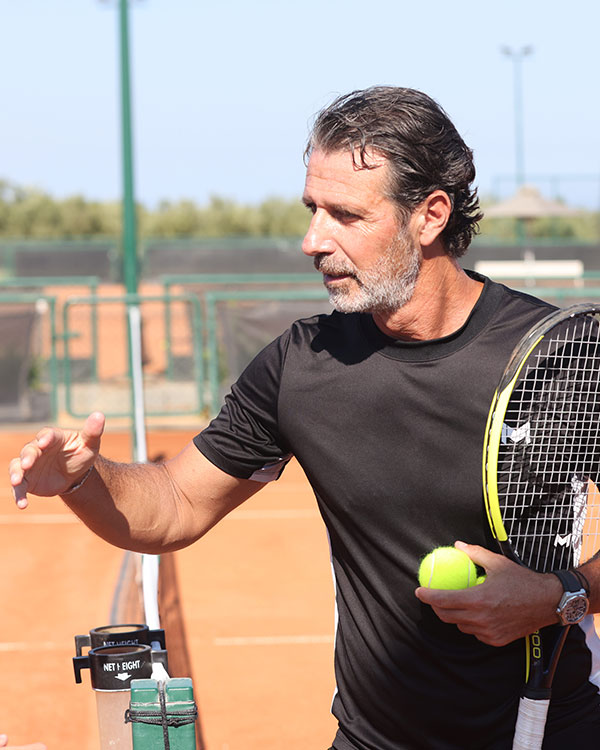
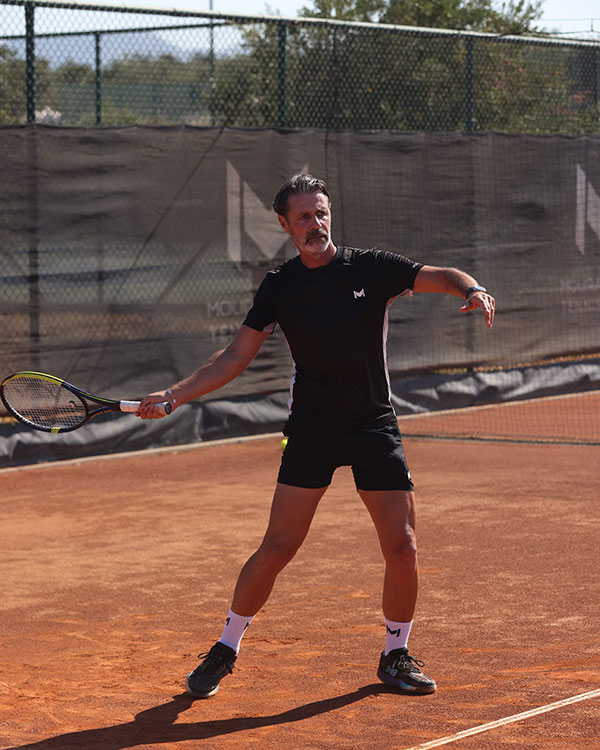
The Mouratoglou Tennis Center here at Costa Navarino has been a significant milestone in expanding your brand as the first of its kind in Europe. Are you happy with its operation so far?
I’m extremely happy with the operation of the tennis center at Costa Navarino. You’re right; it was the first of its kind in Europe, and it’s huge. There’s great energy here, and we’re thrilled to provide this experience to our clients. People don’t necessarily come to Costa Navarino just to play tennis—maybe there are some exceptions—but they come here for incredible holidays in a unique place with so many options, from restaurants to sports. There are numerous opportunities to start a new sport or improve existing skills. At the tennis center, we aim to enhance our guests’ holidays by offering a unique tennis experience. If guests don’t know how to play, we teach them. If they already play tennis, we help them improve. They’re here for a week and might not spend five hours a day on tennis, but even one hour a day can make a significant difference. We also have a program for kids, which is crucial because they have so much energy, and the idea is to channel that energy into learning something new.
From the different options the Mouratoglou Tennis Center offers, including tennis clinics, cross-training, half-day and all-day camps, private and semi-private lessons, and the pro challenge, which have proven to be the most popular for the clients?
All the clinics are the most popular, especially the private clinics. The idea is to offer diverse programs so that everyone can find the best option for themselves. Some people want to improve significantly, while others want to enjoy and have fun. Some guests want to spend several hours a day on the court, while others prefer just one hour. We offer options for individuals who want to practice alone and those who wish to join groups to meet new people. By providing as many different options as possible, everyone can find what suits them best.
Have you had mostly adults seeking to improve their games, or children too?
What’s great about tennis is that it’s a sport you can improve at throughout your life. Whether you’re a kid or an adult who’s been playing tennis for years, you can still improve even if you’re 60. That’s very exciting. People keep playing tennis not only because it’s an incredible sport but also because there’s always room for improvement. That’s one of the most exciting goals in life: to improve.
Have there been many curious first-timers here at the tennis center who’ve never held a racket before?
Absolutely. There are always people who have never played tennis before, and when they find themselves in an incredible environment like this, with the time to relax and explore new activities, they often decide to give it a try. We have plenty of those curious first-timers here.
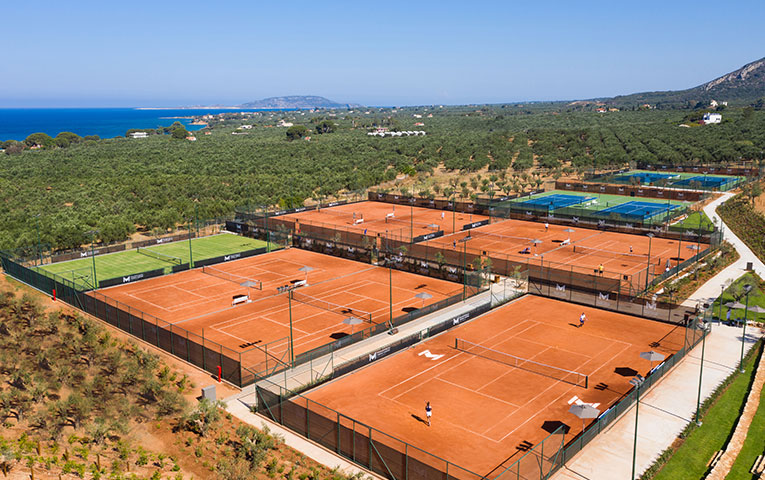
How would you summarize your unique approach to coaching for someone who may not be familiar with your career and achievements in the world of tennis?
From day one, my approach has been to offer something tailor-made for each individual. Everyone is different—different thoughts, actions, and feelings about things. Our job as coaches is to understand each person and adapt our coaching to their specific needs. This has always been my approach, and it has shown incredible results. That’s why we continue to work this way. Philosophically, it aligns with our values, and practically, it has proven effective.
Do you remember the very first lesson you gave to an amateur?
I remember it very well because my attitude was special. I stepped onto the court with the mindset that I wanted this person—whether a man or woman, I don’t recall—to have the best hour on a tennis court of their life. That’s always been my responsibility; I still carry that mindset every time I step on a tennis court. I want the experience to be the best it can be. I’m not saying it always is, but that’s always my purpose.
Do you enjoy training children? And is your approach to them different than that for adults?
Absolutely, I enjoy it very much. The key for anyone on the tennis court is to make the hour special and help them love the experience as much as possible. Kids are different from adults in that they love games, so to make it enjoyable, it’s great to use targets and incorporate playful elements. Especially when they start, tennis techniques can be complicated and take time to master. It’s important that every stage, from the very beginning to when they begin developing good technique, is enjoyable. For kids, making it feel like a game is even more crucial.
Is there an age limit when it comes to getting into the game?
There is no age limit in tennis. You can start playing from a very early age—I started when I was four—and continue playing until the end of your life. It’s a sport where you constantly meet new people, make friends, and have the opportunity to improve.
What counts more in tennis, talent, or hard work and dedication?
It’s not about talent; it’s about mindset, perseverance, and the values of the sport. The greatest champions are often not the most talented. Talent can be tricky because if you’re naturally good at something, you might think you don’t need to put in the effort. When you’re not as talented, you know that only hard work will get you where you want to be, so those people tend to work harder.
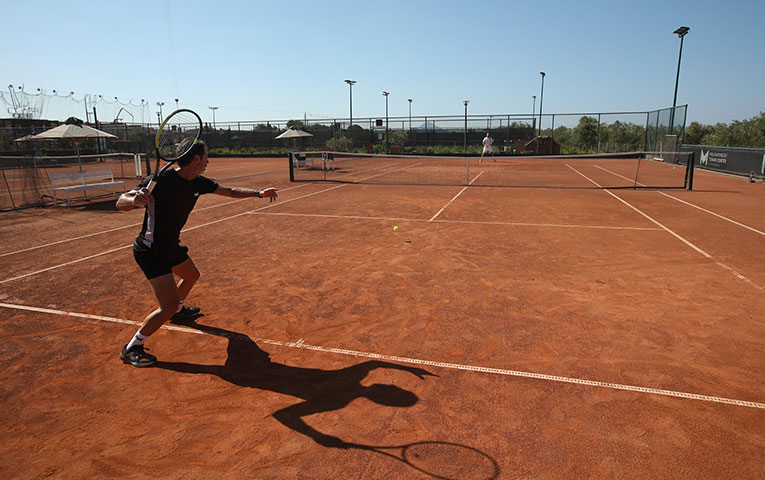
You’ve coached many illustrious names, but no collaboration has proven more enduring than that with Serena Williams. What was the secret of your chemistry with her?
We had a special bond with Serena from the start. As a coach, my job is to find chemistry with my players because, to be successful, they need to trust you completely. I always work to build that connection. With Serena, it was on another level. You can’t always decide that; it’s just how it is with some people. Our mutual trust and connection were strong, and together, we achieved incredible things, like multiple Grand Slams.
What is your main focus professionally these days? Do you constantly seek opportunities for more high-profile competition, or are you equally happy serving the sport through academies and other ventures?
As you mentioned, I have a lot of activities. My tennis academy’s role is to build the next generation of champions, like Coco Gauff, Stefanos Tsitsipas, and Holger Rune. We work with over 200 kids annually, helping them through school and tennis, and we host 5,000 people a year for camps. I also develop tennis centers like Costa Navarino, the biggest in Europe. On social media, I share what I’ve learned about tennis to help others improve. I write books and coach players. It’s a lot of work, but my work is my passion, so it doesn’t feel like work.
In what ways has tennis helped you evolve as a person?
Tennis has saved my life. It might sound dramatic, but it’s true. As a kid, I had zero self-esteem, was bad at school, and extremely shy. I couldn’t connect with people, but on the tennis court, I felt good because I was good at something. People valued me there, both as a player and a person. I didn’t feel shy because I was confident in my skills. The tennis court was my safe space; without it, I don’t know where I’d be today. Tennis saved my life, and I’ve dedicated myself to giving back to the sport.
* This conversation has been edited for length and clarity.
